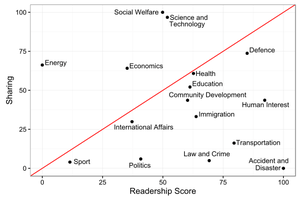I have a new article out in the Journal of Communication which analyses which types of news get shared the most. Based on articles published in BBC news, the research shows that even though readership drives sharing in general, certain types of articles lend themselves more to being shared than others.
The graphic above gives a glimpse of some of the results, by visualising the relationship between reading and sharing for different categories of news article. We can see that reading and sharing are not in a linear relationship: rather some types of article are well shared but not well read, and vice versa. For example, stories about technology and social welfare seem to be shared more, whilst stories about violent crime and accidents are shared less. This creates a social “news gap” (following Boczkowski and Mitchelstein’s traditional news gap) whereby peoples preferences for sharing and their preferences for reading diverge. I suggest that, as more and more people start to consume news on social media, the implications of this become potentially more profound: as social media starts to filter out certain types of news whilst emphasising others.


